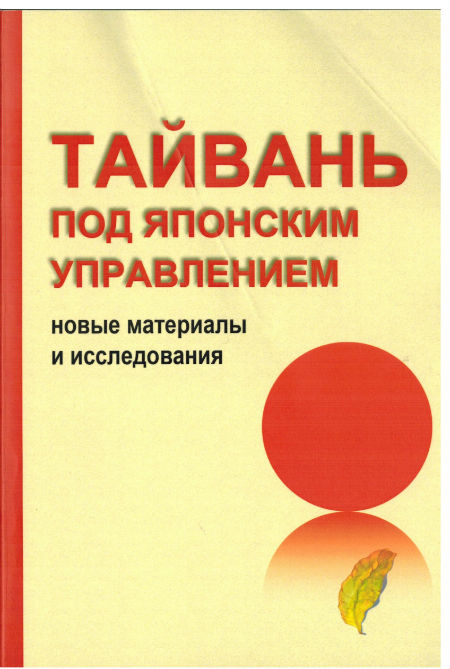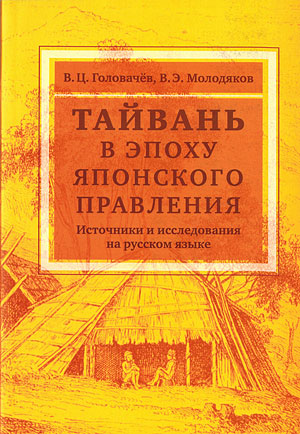The Center for Taiwanese Studies (CTS) was established in 2012, based on the decision of the Academic Council of the Institute of Oriental Studies of the Russian Academy of Sciences (Minutes No. 1 of February 22, 2012).
The staff includes employees of the Department of China, the Center for Japanese Studies, the Center for Research on the Common Problems of the Modern East, and others.
Head: Valentin Golovachev, PhD in History.
Object and directions of research
Taiwan, the Taiwan Region, relations between the two sides of the Taiwan Strait, Russian-Chinese relations and international relations in the context of Eurasian history and the modern “Taiwan problem”
Goals
- Activization, increase of the scale and level of “Taiwan studies” (TS) in the Institute of Oriental Studies of the Russian Academy of Sciences and in the Russian Federation. In particular:
a) the introduction of Russian orientalists to the world "Taiwanese research"
b) the entry of Russian TSs into the world scientific revolution and applied area
c) preparation of Russian scientists-experts in the field of TS. - Strengthening international relations of the Institute of Oriental Studies of the Russian Academy of Sciences, increasing the scientific authority of the Institute of Oriental Studies in the Russian Federation and abroad.
- Promoting the development of scientific and other ties between the Russian Federation, the People's Republic of China and Taiwan.
- Dissemination of information about Taiwan in Russia and about Russia in Taiwan.
Taiwan as an object of scientific research
History and culture: From antiquity to the XXI century. Taiwan is a crossroads of migrations and meetings of many nations, languages, cultures, civilizations. Today, it is inhabited by aborigines, Chinese and other representatives of almost 70 ethnic groups.
Historically, it was under the rule of the European colonialists (XVII century, the Dutch and Spaniards), the Chinese empire (1661-1895), Japan (1895-1945), the Republic of China (since 1945). In 1874, he became the object of a sharp diplomatic relationship between China and Japan, in connection with the issue of sovereignty and real control of China over the island. In 1895, it was annexed by Japan and for 50 years it was mastered as the first Japanese “exemplary colony in Asia”. After the evacuation of the Chiang Kai-shek government in 1949, the “Taiwan problem”, the “problem of China’s representation in the UN”, the problem of “Taiwan identity”, etc., arose on the island.
Economy: Japanese colonial heritage, post-war economic reforms, the "economic miracle of Taiwan" and the complex integration of the island into the system of modern regional and global international economic relations.
Politics: “White Terror” (late 1940s), “soft authoritarianism” and a successful transition from authoritarianism to real democracy (late 1980s - mid 1990s). Democratic movement and the struggle of political parties, the movement for the independence of Taiwan, ethno-cultural interaction and politics, international relations, relations between the two sides of the Taiwan Strait, relations with the Russian Federation and the CIS countries (former Soviet republics).
Science and culture: Taiwan is the place of storage of unique sources and materials in Taiwan, China, Asia. The synthesis of Chinese, European and Japanese scientific traditions, a huge scientific and cultural potential make the island an important world center for Sinology / Oriental and other scientific research. The richest multicultural heritage is a key object of conservation and study. The problems of studying Taiwan go beyond the scope of China itself, therefore, colleagues from a number of departments and centers of the Institute of Oriental Studies participate in the work of the CTS.
History of Taiwan studies in Russia
In Russia, the study of Taiwan has been conducted since the XVIII century. Information about him came through Europe and from Russian Siberia / Far East of Russia. It intensified after the “opium wars” and after the island was transformed in 1895 into a Japanese colony, when the Russians visited the island to study it. But until the early 1990s. The study was conducted inactively, by individual enthusiasts, travelers and scientists. Active, including collective research began after the renewal of de facto relations between Taiwan and the Russian Federation (since 1991). In the early 2000s, compared with the 1990s, the study of Taiwan in the Russian Federation experienced a relative decline. But in recent years, it has entered a new level and reached a new stage at the expense of an international scientific partnership (collaboration with colleagues in Japan, the PRC and in Taiwan).
Taiwan Study Centers in the Russian Federation
Geography: Moscow (IFES RAS, ISAA MSU, IOS RAS), St. Petersburg (St. Petersburg State University), Novosibirsk, Tomsk, Vladivostok.
Structures: The Center for the Study of Taiwan and the problems of emigration has been operating since the 1990s. in the IFES RAS. In the 1990s. there was a sector for the study of Taiwan under the Department of China of the Institute of Oriental Studies of the Russian Academy of Sciences.
Experience, results and resources in the study of Taiwan
- In the 1990s. The Taiwan Sector under the China Department was created at the Institute of Oriental Studies of the Russian Academy of Sciences, headed by P.M. Ivanov. Its staff published dozens of articles, collections, monographs, held conferences and seminars on the topic of Taiwan and relations in the Taiwan Strait.
- After 2004, several monographs and about fifty articles on history and modern Taiwan were published at the Institute of Oriental Studies of the Russian Academy of Sciences.
- In cooperation with the Taiwan State University (TSU), "The International Radio of Taiwan" and the Chinese Academy of Social Sciences (Beijing) in 2009-2012. The project “Chinese History - Oral History” is being successfully conducted. The coordinator of the Russian part of the project is the Department of China, IOS RAS and the CTS.
- Studies are being conducted on the topic “Russian-Taiwanese relations (1991-2011): history, modernity, and prospects.” The materials were published in Taiwan and in Russia. - Together with the Japanese University Takusyoku and the Research Institute of Taiwan History at the Sinika Academy (Taipei), since 2012, an international project has been implemented to study Taiwan in the era of Japanese colonial rule.
- Participation in the defense of theses on Taiwanese research: leadership, official opposition, writing reviews and reviews
- Information is being disseminated about Taiwan in Russia and about Russia in Taiwan.
- 09/01/2011 A cooperation agreement was signed between the Institute of Oriental Studies and the National Central Library in Taipei (NCB). It was decided to donate from the funds of the NCB "Cabinet of Taiwanese Literature" - more than 500 volumes and video materials for the CITR at the Institute of Executive Sciences of the Russian Academy of Sciences (already sent). There is an annual exchange of scientific literature.
- In 2010, after a visit to Taiwan V.V. Naumkina has established direct links with the leading scientific and educational centers of the island (Academy Sinika, TSU, Zhengzhi University, Tamkan University)
Perspectives of Taiwanese Studies at the Institute of Oriental Studies
The following scientific, educational, material, organizational and personnel measures are planned:
- Research on grants, collection of archival and field materials
- Establishment and support of scientific and educational relations between the Institute of Oriental Studies of the Russian Academy of Sciences and Taiwan, between Russian, Taiwanese and Japanese scientists
In particular, together with the TSU, an application was submitted for a bilateral grant of the RSHF-NNS Taiwan for the continuation of the project “Chinese Studies - Oral History” in 2012-2014. since 203, a trilateral international research project (Russia-Japan-Taiwan) has been successfully implemented to study the history of the island in the 19th century. and in the colonial period (1895-1945).
- Preparation of expert assessments and materials on modern Taiwan, Russian-Taiwanese relations, relations between the two sides of the Taiwan Strait.
- Work with Russian and foreign media.
- Publications on history, historiography, modern politics, economics, ethnic topics (articles, collections, monographs).
- Lectures: development of individual lectures, lecture courses, training seminars.
- Replenishment of the book fund of TRC: "Chinese Cabinet" , etc.
- Participation and holding of scientific conferences, seminars.
- Promoting the general study and development of Russian ties with Taiwan.
- Other activities.

